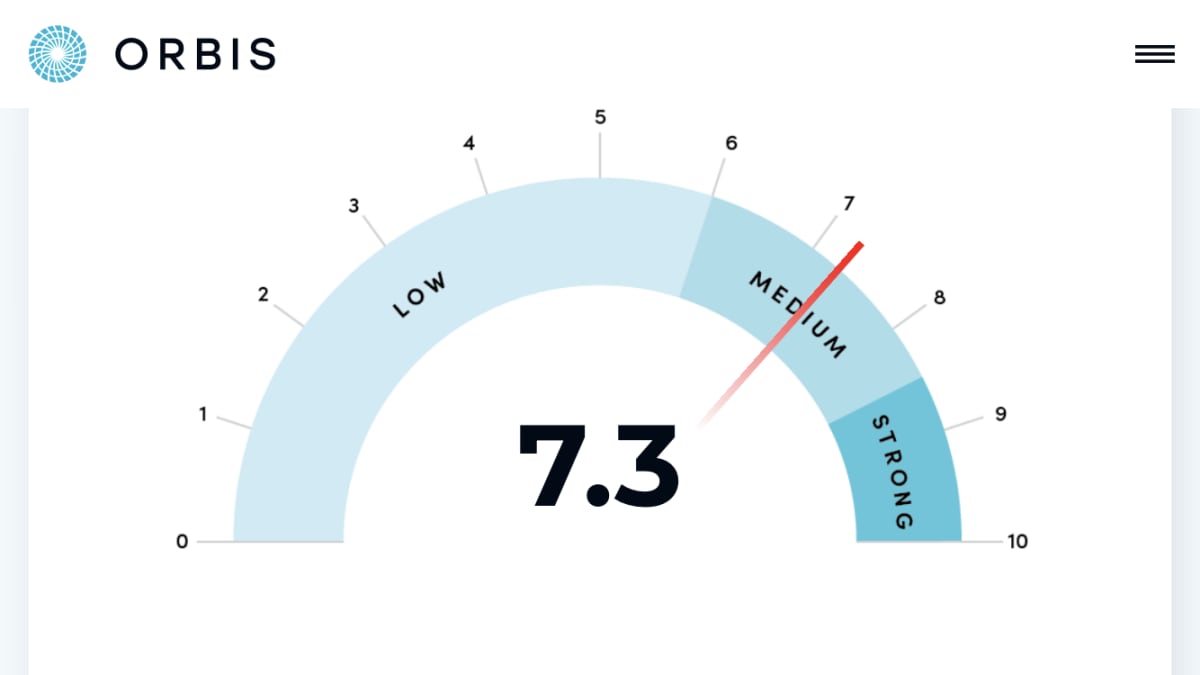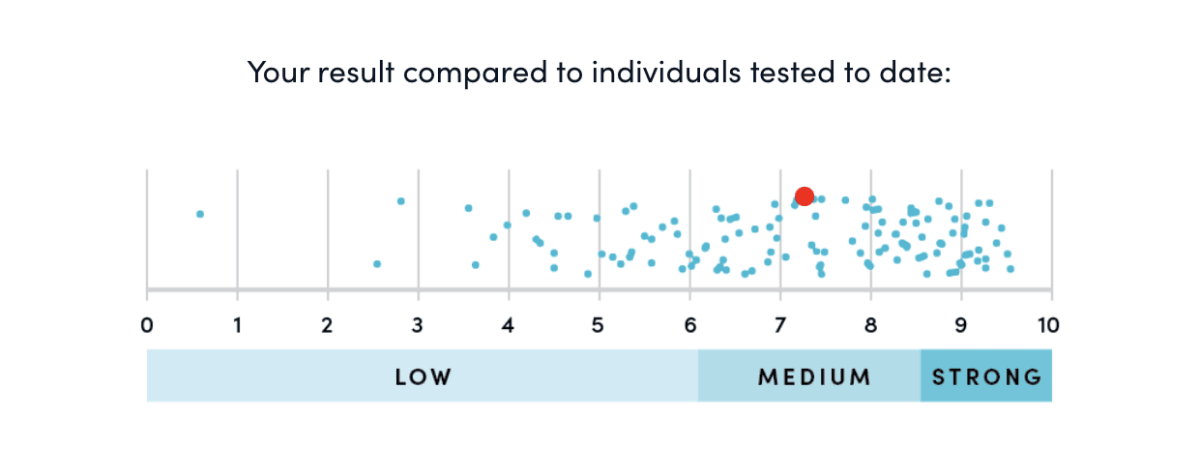
New Zealand-developed technology means people wanting to know how strong their immunity is to Covid-19 will soon be able to get tested at a pharmacy. Business editor Nikki Mandow gave it a try.
Covid immunity is an uncertain thing. We know young people are more likely to be protected than older people; those who are fully vaccinated have more immunity than those who aren't.
If you have had the virus, particularly if it was recently, you are likely to be safe from it - but it's not 100 percent.
Which is to say there are some guidelines, but nothing is certain. Some older people have more antibodies - and therefore stronger immunity - than some young people. We also know immunity wanes over time - that’s why New Zealanders were offered a booster and may need another.
Various countries, including Denmark, Israel and Chile are giving a fourth jab to people with severely weakened immune systems; the UK will extend that to over-75s over the next couple of months.
So how do I know how I stand immunity-wise - good, bad or moderate? Not just my immunity as part of a demographic - 57 years old, boosted on January 24, seemingly healthy - but as an individual?
What if I want to get on an international flight, go to a wedding or a concert? How do I judge my risk of getting Covid?
A strategic agreement between Green Cross Health, owner of the Unichem and Life Pharmacy brands, and Auckland-based research company Orbis Diagnostics looks like making that possible.
Next month, the two companies will begin a two-month pilot at one as-yet-unnamed Auckland pharmacy, allowing people to take a blood test which will give them a read-out of how strong their immunity levels are on a scale of one to 10.
Tests will cost $100 each and people will get the result back the same day. As long as demand is high enough - and the pilot pharmacy should be able to handle up to 50 tests a day - testing will be rolled out to other pharmacies at the end of the pilot.
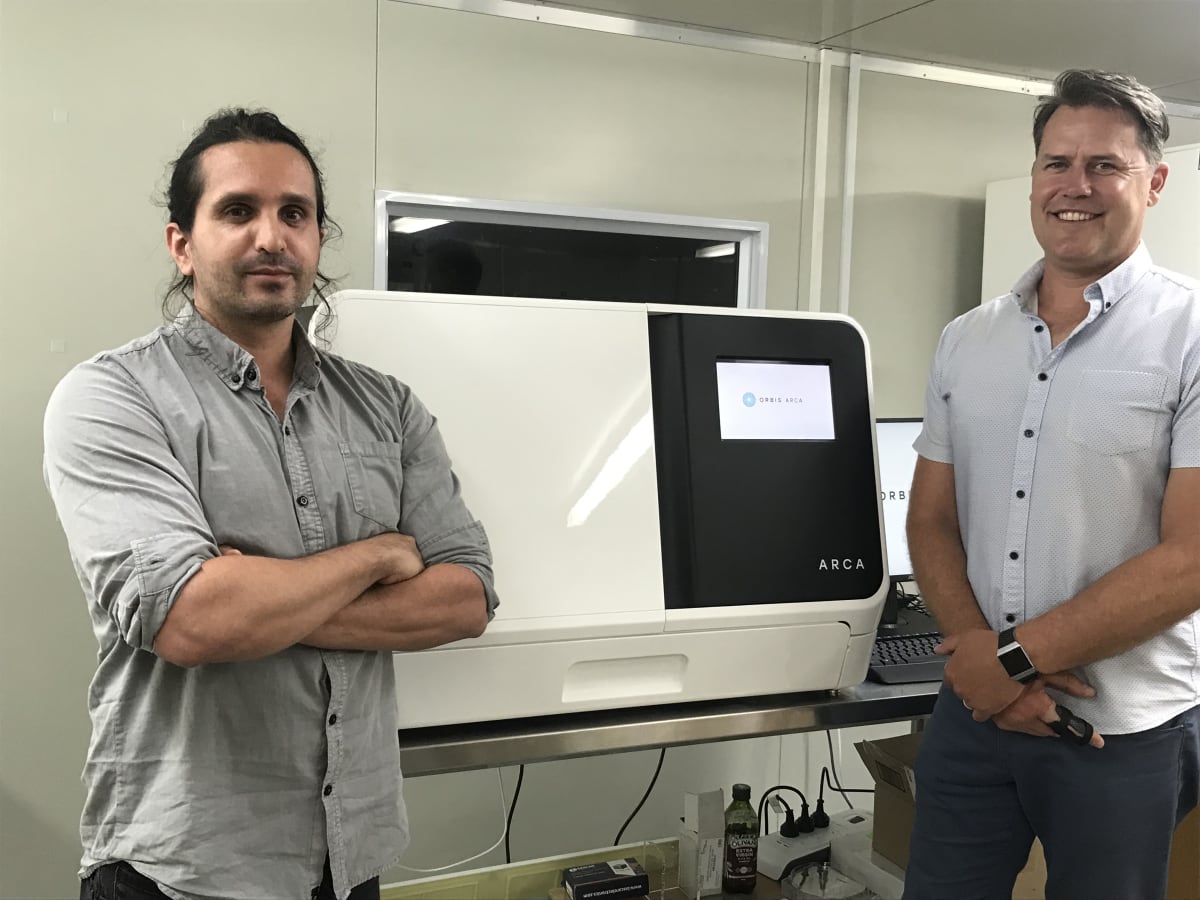
“We can identify individuals with a strong, medium and waning immune response to the Covid-19 vaccine,” says Orbis chief executive Damian Camp. “We will also be able to quickly adapt our technology as new vaccinations are produced to fight future variants of the virus.”
Camp reckons demand will be strong.
“There will be some people curious about their own response to the vaccination, others will be planning to travel or make a decision about going to a concert or a wedding. There might be people deciding when is the best time to have another booster shot, or it could be used by employers wanting to give some comfort to people who are hesitant to return to work.
“We can also see a use for it with frontline workers who may be exposed to Covid on a day-to-day basis and want to make sure their immunity level is high.
“It’s about focusing on the individual.”
In the future, the same equipment could be used to test for non-Covid antibody-related things - flu or celiac disease, for example, says Green Cross chief operating officer Alison Van Wyk. You’d just change the reagent in the machine to test for something different.
“A key driver for introducing this technology into our pharmacy network... is its ability to provide accurate health diagnostics that allow consumers to make informed decisions with confidence,” she says.
Covid antibodies 101
Professor David Williams is chief scientist and vice president of product development at Orbis, and one of the brains behind its ‘lab-in-a-box’ testing machine. He has a particular talent for explaining complicated things simply.
The antibody test works like this, he says: Imagine the Covid virus spike protein we’ve all seen pictures of. The antibodies to that virus are kind of sticky - they bind to the protein, coat it and fight it. If there are enough antibodies they can completely coat the virus, stopping it get into your cells.

Vaccines like Pfizer trigger the antibodies, which then float around in the blood scouting out the virus.
What happens with the Orbis test is the reagent contains a bead with a small but important part of the virus spike protein on it. When you add the blood, the antibodies rush to stick to that bit of spike protein.
All you have to do then is count the number of antibodies, apply an algorithm Williams designed based on research around how the number of antibodies changes over time post vaccine, and how vaccine efficacy correlates with antibody concentration.
And lo - an immunity score.
Mandow makes a decision
As it happens, I am getting on a plane soon - well, Covid and war permitting. A trip to visit a daughter in Italy, and family in the UK. So when I got an offer to try out the Orbis antibody test, I was pretty interested.
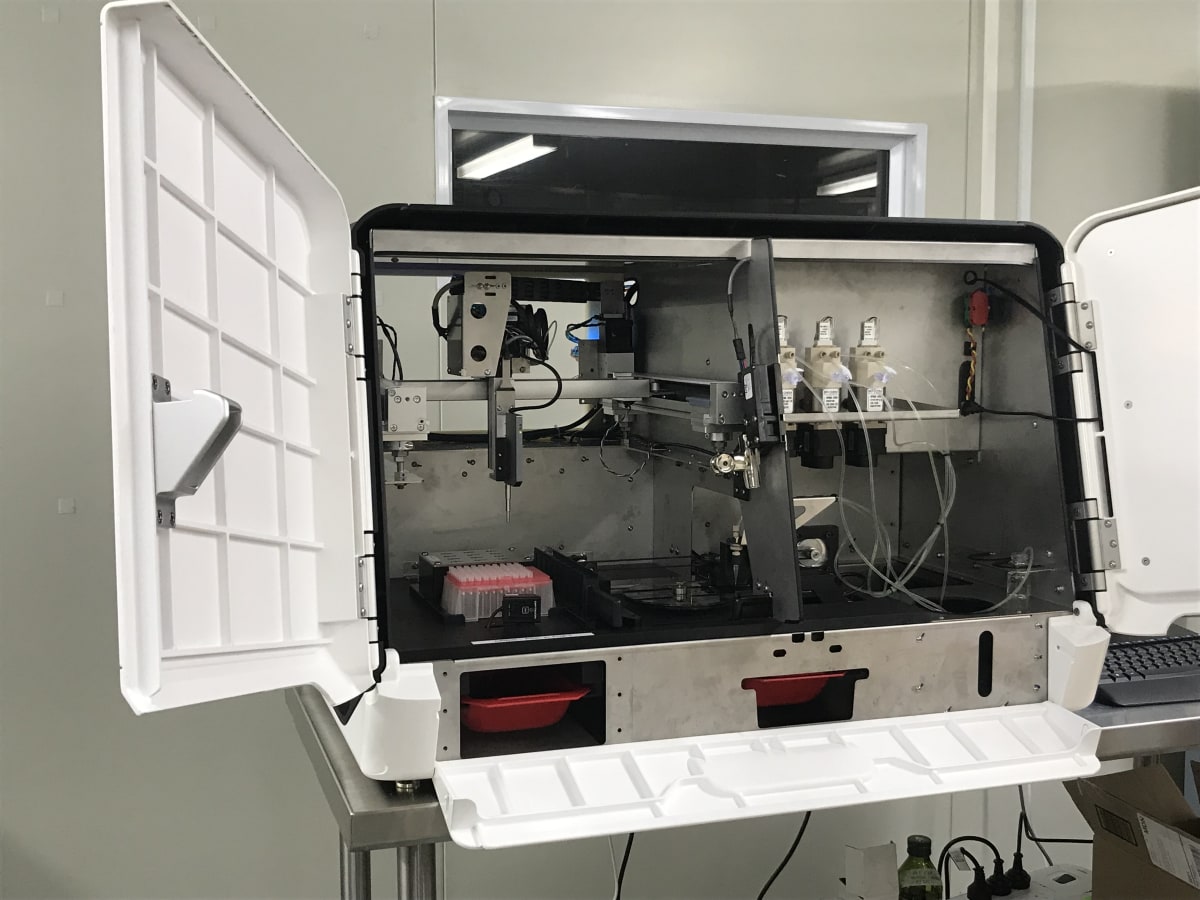
The 'lab-in-a-box' machine that will go to the chosen pharmacy next month is at the moment sitting in a lab in Penrose. It's a large black and white case with big doors - like a big TV cabinet. Inside is science-y looking equipment - vials and tubes and a dropper thing.
I sit at a table next to the machine and have a small amount of blood taken out of my middle finger. The blood goes into a small vial, ready to be dropped onto what looks like a patterned CD in the black and white box. The CD is divided into slices like a pizza and each slice will hold a bead of reagent and take a different blood sample.
Up to eight can be tested at a time on the same disc.
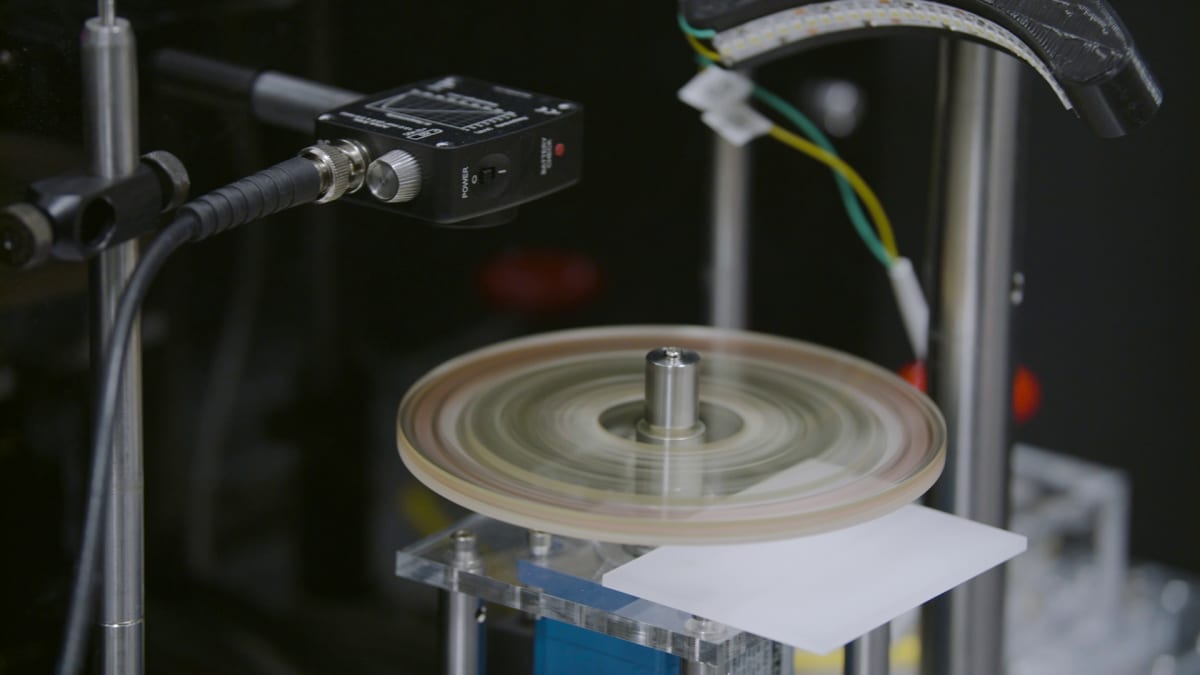
After my test I go back to the office - and wait. Just under four hours later my result comes back - 7.3. Medium. It’s not great news in terms of my overseas trip, but it’s not a disaster.
“You might want to be a bit more cautious than you might otherwise have been,” says Orbis executive team member Bronwynne Howse.
Avoid crowded bars, keep your mask on, and keep away from too much hugging and air kisses with long-unseen family and friends in Europe.
Howse reminds me there are three parts to the risk of getting Covid - the chance of coming into contact with an infected person, the chance that droplets from that infected person get into my nose, and then the chance that the virus, once transmitted, escapes my immunity.
That last is the part the Orbis test is testing.
“At 7.3 there’s an approximately 25 percent chance if you inhale a dose of the virus it will get through your defences,” Williams says.
Howse was tested at the same time as I was earlier this week. She’s a similar age to me (well, a few years younger) and coincidentally had her booster within a day of me having mine - January 24 and 25.
Her score on the test was 9, as against mine at 7.3.
I wish I had her immunity getting on the plane next month. Even better, I wish I had that of a guy also being tested while I was at the lab. He’d recovered from Covid two weeks before and scored 9.2.
“It shows everyone has an individual immune response. We were both vaccinated at the same time and boosted at the same time." Bronwynne Howse, Orbis
Actually, this isn’t my first immunity score. In December 2021 Howse took me to the same lab in Penrose to try out the Orbis test. At that stage we were both post-second shot, but pre-booster. That time she was 5.8, I was 6.1.
“It shows everyone has an individual immune response,” she says. “We were both vaccinated at the same time and boosted at the same time. But it demonstrates that age could come into it, but so could our different body’s response.
She doesn’t say it, but I know Howse is just slightly smug.
From cow to Covid
Newsroom first wrote about Orbis just over a year ago, when the company was looking at how its testing might be used at airports to help restart global travel.
But the genesis of the technology happened back in 2015 and came out of a project to test cows' progesterone levels in the milking shed to see whether they were ready for insemination. (Progesterone levels change at a time when the cow is getting more fertile).
Instead of blood, it was milk on the disc.
Covid saw Orbis, which is backed by early stage investment funding company Pacific Channel and has recently finished the first half of a $15 million capital raising round, pivot from cow to Covid, although the company hasn’t abandoned a dairy application in the future.
The company is also still working with multi-billion-dollar French biometrics and digital identity firm Idemia on how personalised health data - including someone’s Covid immunity status - could be combined securely with the sort of biometric identity data used at airports, for example.
So, was it a good thing for me to take the immunity test? The result has made me less blasé than I was; more worried, but also more informed. I’ve decided to pay for a (flexible) plane ticket and take my chances. I know the risk - 7.3 - and I’m taking it.
Fingers crossed.
